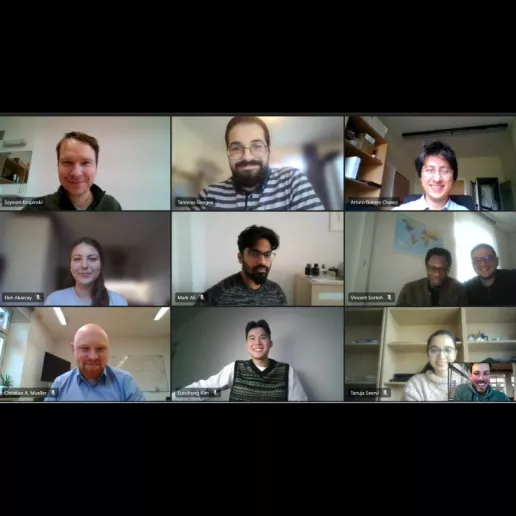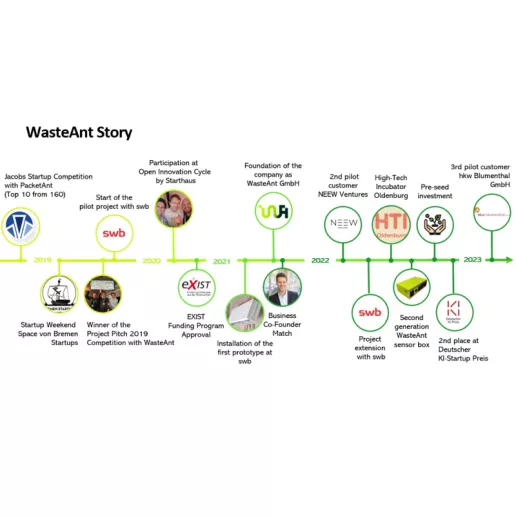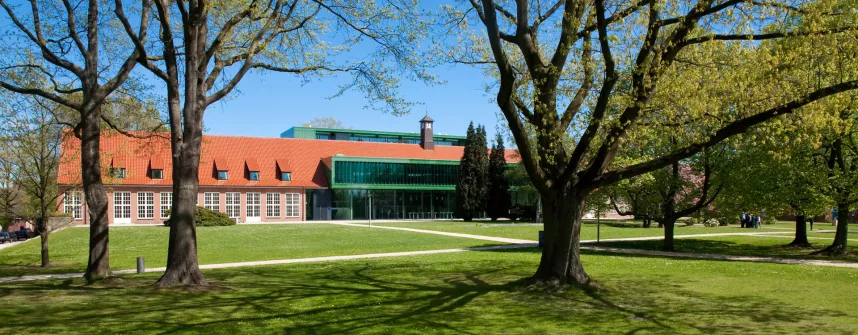Evaluating waste with AI: Start-up WasteAnt on the rise
WasteAnt's technology makes waste flows transparent, increases the efficiency of waste-to-energy and recycling plants, and helps to reduce emissions of harmful gases. Within the last year, the startup, founded at Constructor University in Bremen, has signed its first contract, found new partners, secured Pre-Seed funding, and expanded its team to sixteen employees.
Each disposal truck takes about 15 tons of waste to the swb recycling plant in Bremen; around 850,000 tons are thermally recycled here every year. The problem: The operators of incineration and sorting plants like swb do not know the quality and composition of the delivered waste. Contaminants can cause damage or shut down the plants. Without knowledge of the composition of the waste, it is harder and more expensive to reduce the production of flue gases such as CO2 or SO2.

This is where WasteAnt's solution comes in. Three of the four founders, Dr. Szymon Krupinski, Dr. Christian Müller and Arturo Gomez Chavez, are scientists who met while studying at Constructor University in Bremen. Their office is still located on campus. The trio developed a system consisting of sensor boxes, cameras, and Artificial Intelligence-based software that records, monitors and characterizes waste streams around the clock. "This technology is unique in Bremen and pioneering in the waste industry," said Gomez Chavez.
The start-up, founded in 2021, tested the technology in a pilot project together with swb in parts of the recycling plant in Bremen. Since then, the process has been expanded to the entire plant and a contract has been signed. This spring, the heat and power plant Blumenthal has been added as a further customer. The focus is on better determining the composition of the waste and predicting its calorific value to reduce fluctuations in the incineration and energy production processes. A more homogeneous incineration process means electricity generation from waste will be more efficient, emissions will decrease, and waste plants will be able to accept more waste that would otherwise be landfilled.
Waste-to-energy plants generate several million tons of carbon dioxide per year. From 2024, the plants are to be included in the greenhouse emissions trading scheme, providing a significant incentive to reduce them. "Measuring emissions is becoming increasingly important," said Krupinski, "we want to develop our technology to improve calorific values and produce an accurate prediction of expected CO2 emissions." It can also be applied to other areas beyond thermal waste treatment, such as approaches to recycling or biomass treatment. "We would like to expand further and have WasteAnt contribute to the improvement of the circular economy," he added.

The process developed by WasteAnt convinced Bremen's Aufbau-Bank, Hightech Inkubator Oldenburg (HTI), as well as private investors: They support the start-up with a low seven-digit Pre-Seed funding. This funding also helped grow the team: The young company now employs more than a dozen individuals. The location on the campus of Constructor University is a great advantage as many of the employees are students of the Computer Science and Software Engineering or Data Engineering graduate programs. The team is as international as the university itself: The employees come from Mexico, Poland, Germany, Lebanon, Turkey, Trinidad and Tobago, South Korea, Canada and Ghana. "We are very proud of what we have achieved so far, and without a doubt the diversity of the team has contributed to that," said Gomez Chavez.
WasteAnt has grown quickly, and the learning curve continues to be steep for the four founders, including Maxmilian Storp, CEO of Business. "None of us came into the world knowing how to be the CEO of a startup; it is all learning by doing," Krupinski said. “Experiencing how things come together and evolve: the technology, its implementation in everyday life, the team – this is highly satisfying,” he added.
More information:
https://wasteant.com
Contact:
info@wasteant.com
Image 2 + 3: From a competition idea to a full-time job: Constructor University Alumni start-up WasteAnt on the rise. (Source: WasteAnt)
About Constructor University:
An international community, vibrant and diverse. Offering academic excellence, ensuring the highest standards in research and teaching. Empowering students to solve the world's pressing challenges through knowledge and science: Constructor University is a top-ranked, English-speaking, private university. Founded in 2001, it provides a wide range of 25+ academic programs and PhD. The Constructor ecosystem comprises the University, located in Bremen, Germany, and an institute in Schaffhausen, Switzerland.
Over 1.800 students from more than 110 nations on campus benefit from a unique interdisciplinary, foundational theoretical and practical education. Enriched with a buzzing entrepreneurial culture that prepares young professionals to thrive in the job market. With 6.000+ alumni worldwide, our community keeps growing – with our highest cohort ever registered in 2022.
The research-centric faculty projects are funded by the German Research Foundation and the European Union's Framework Program for Research and Innovation as well as by globally leading companies.
The Constructor ecosystem benefits from partnerships with high-ranked universities such as Carnegie Mellon, the University of Geneva or the National University of Singapore School of Computing, and technology companies such as Anisoprint, JetBrains and ChemDiv.
Constructor is a global institution dedicated to addressing the main challenges of the world through science, education, and technology. Apart from the University in Bremen, the ecosystem comprises an Institute in Schaffhausen (Switzerland) and several for-profit entities that provide technology infrastructures and solutions, life-long education programs, consulting services, and funding.
